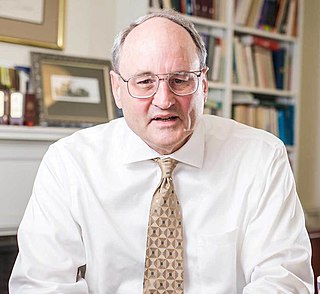Related Research Articles

An election is a formal group decision-making process by which a population chooses an individual or multiple individuals to hold public office.

A political party is an organization that coordinates candidates to compete in a particular country's elections. It is common for the members of a party to hold similar ideas about politics, and parties may promote specific ideological or policy goals.

The 1980 United States presidential election was the 49th quadrennial presidential election, held on Tuesday, November 4, 1980. The Republican ticket of Ronald Reagan and George H. W. Bush defeated incumbent Democratic president Jimmy Carter and incumbent vice president Walter Mondale in a landslide victory.

A political campaign is an organized effort which seeks to influence the decision making progress within a specific group. In democracies, political campaigns often refer to electoral campaigns, by which representatives are chosen or referendums are decided. In modern politics, the most high-profile political campaigns are focused on general elections and candidates for head of state or head of government, often a president or prime minister.
Negative campaigning is the process of deliberately spreading negative information about someone or something to worsen the public image of the described. A colloquial, and somewhat more derogatory, term for the practice is mudslinging.

In politics, campaign advertising is propaganda through the media to influence a political debate and, ultimately, voters. Political consultants and political campaign staff design these ads. Many countries restrict the use of broadcast media to broadcast political messages. In the European Union, many countries do not permit paid-for TV or radio advertising for fear that wealthy groups will gain control of airtime, making fair play impossible and distorting the political debate.

The Sixth Party System is the era in United States politics following the Fifth Party System. As with any periodization, opinions differ on when the Sixth Party System may have begun, with suggested dates ranging from the late 1960s to the Republican Revolution of 1994. Nonetheless, there is agreement among scholars that the Sixth Party System features strong division between the Democratic and Republican parties, which are rooted in socioeconomic class, cultural, religious, educational and racial issues, and debates over the proper role of government.

Larry Martin Bartels is an American political scientist and the Co-Director of the Center for the Study of Democratic Institutions and Shayne Chair in Public Policy and Social Science at Vanderbilt University. Prior to his appointment at Vanderbilt, Bartels served as the Donald E. Stokes Professor of Public Policy and International Relations and founding director of the Center for the Study of Democratic Politics at the Woodrow Wilson School of Public and International Affairs at Princeton University. He was elected a Member of the American Philosophical Society in 2019.
Voting behavior refers to how people decide how to vote. This decision is shaped by a complex interplay between an individual voter's attitudes as well as social factors. Voter attitudes include characteristics such as ideological predisposition, party identity, degree of satisfaction with the existing government, public policy leanings, and feelings about a candidate's personality traits. Social factors include race, religion and degree of religiosity, social and economic class, educational level, regional characteristics, and gender. The degree to which a person identifies with a political party influences voting behavior, as does social identity. Voter decision-making is not a purely rational endeavor but rather is profoundly influenced by personal and social biases and deeply held beliefs as well as characteristics such as personality, memory, emotions, and other psychological factors. Voting advice applications and avoidance of wasted votes through strategic voting can impact voting behavior.
An audience cost, in international relations theory, is the domestic political cost that leaders incur from their constituency if they escalate a foreign policy crisis and are then seen as backing down. It is considered to be one of the potential mechanisms for democratic peace theory. It is associated with rational choice scholarship in international relations.

Henry E. Brady is an American political scientist specializing in methodology and its application in a diverse array of political fields. He was Dean of the Goldman School of Public Policy at University of California, Berkeley from 2009–2021 and holds the Class of 1941 Monroe Deutsch Professor of Political Science and Public Policy. He was elected President of the American Political Science Association, 2009–2010, giving a presidential address entitled "The Art of Political Science: Spatial Diagrams as Iconic and Revelatory." He has published academic works on diverse topics, co-authoring with colleagues at a variety of institutions and ranks, as well as many solo authored works. His principal areas of research are on political behavior in the United States, Canada, and the former Soviet Union, public policy and methodological work on scaling and dimensional analysis. When he became President of the American Political Science Association, a number of his colleagues and co-authors contributed to his presidential biography entitled "Henry Brady, Big Scientist," discussing his work and the fields to which he has contributed and has also shaped.
Lynn Vavreck is an American political scientist and columnist. She is the Marvin Hoffenberg Chair in American Politics and Public Policy at University of California, Los Angeles and a contributing columnist to The New York Times.
Political cognition refers to the study of how individuals come to understand the political world, and how this understanding leads to political behavior. Some of the processes studied under the umbrella of political cognition include attention, interpretation, judgment, and memory. Most of the advancements in the area have been made by scholars in the fields of social psychology, political science, and communication studies.

The media coverage of Bernie Sanders, a U.S. Senator from Vermont, became a subject of discussion during his unsuccessful 2016 and 2020 presidential runs. His campaigns, some independent observers, as well as some media sources have said that the mainstream media in the United States is biased against Sanders. Others say that coverage is unbiased or biased in his favor. The allegations of bias primarily concern the coverage of his presidential campaigns.
Media coverage of the 2016 presidential election was a source of controversy during and after the 2016 election, with various candidates, campaigns and supporters alleging bias against candidates and causes.

Lawrence R. Jacobs is an American political scientist and founder and director of the Center for the Study of Politics and Governance (CSPG) at the University of Minnesota. He was appointed the Walter F. and Joan Mondale Chair for Political Studies at the University of Minnesota's Humphrey School of Public Affairs in 2005 and holds the McKnight Presidential Chair. Jacobs has written or edited, alone or collaboratively, 17 books and over 100 scholarly articles in addition to numerous reports and media essays on American democracy, national and Minnesota elections, political communications, health care reform, and economic inequality. His latest book is Democracy Under Fire: Donald Trump and the Breaking of American History. In 2020, he was elected a Fellow of the American Academy of Arts and Sciences.
Neil Malhotra is an American political economist. He is the Edith M. Cornell Professor of Political Economy in the Graduate School of Business at Stanford University, where he is also the Louise and Claude N. Rosenbrg, Jr. Director of the Center for Social Innovation. He studies the politics of the United States, survey methodology, and voter behavior in elections, including work on retrospective voting and disaster preparedness and relief politics.

Political polarization is a prominent component of politics in the United States. Scholars distinguish between ideological polarization and affective polarization, both of which are apparent in the United States. In the last few decades, the U.S. has experienced a greater surge in ideological polarization and affective polarization than comparable democracies.
Rational choice is a prominent framework in international relations scholarship. Rational choice is not a substantive theory of international politics, but rather a methodological approach that focuses on certain types of social explanation for phenomena. In that sense, it is similar to constructivism, and differs from liberalism and realism, which are substantive theories of world politics. Rationalist analyses have been used to substantiate realist theories, as well as liberal theories of international relations.

Timothy James Colton is a Canadian-American political scientist and historian currently serving as the Morris and Anna Feldberg Professor of Government and Russian Studies at Harvard University. His academic work and interests are in Russian and post-Soviet politics. He is currently an editorial board member for World Politics and Post-Soviet Affairs. He has been a fellow of the American Academy of Arts and Sciences since 2011. He is the brother of former CBC Radio Washington, D.C. correspondent, Michael Colton.
References
- ↑ "The Catalyze podcast: Civic Engagement Pt. 1: Voting this November, with political scientist John Sides '96". Morehead Cain Foundation. 1 September 2020. Retrieved 3 March 2022.
- 1 2 "John Sides". Vanderbilt University. Retrieved 3 March 2022.
- ↑ "Incumbents face off in district 32". Austin Daily Texan. 22 October 2004. Retrieved 3 March 2022.
- ↑ Wihbey, John (7 February 2013). "Research chat: Political scientist John Sides on election 2012". The Journalists' Resource. Retrieved 3 March 2022.
- ↑ Sides, John (2011). "The Political Scientist as a Blogger". PS: Political Science & Politics. 44 (2): 267–271. doi:10.1017/S1049096511000060. ISSN 1049-0965. S2CID 154727650.
- ↑ "How academic blog 'Monkey Cage' became part of the mainstream media". www.insidehighered.com. Retrieved 2020-03-13.
- ↑ Reviews include:
- Collens, Jack D. (2021). "Sides, John, Michael Tesler, and Lynn Vavreck. Identity Crisis: The 2016 Presidential Campaign and the Battle for the Meaning of America Princeton, NJ: Princeton University Press, 2018. 343 pages. $29.95 (hardcover); $17.95 (softcover)". Congress & the Presidency. 48 (1): 118–119. doi:10.1080/07343469.2020.1865081. S2CID 232223407.
- Smith, Candis Watts (2020). "Review of Identity Crisis: The 2016 Presidential Campaign and the Battle for the meaning of America". American Review of Politics. 37 (1): 175–176. doi: 10.15763/issn.2374-779X.2020.37.1.175-176 .
- Niebler, Sara (2019). "John Sides, Michael Tesler, and Lynn Vavreck. Identity Crisis: The 2016 Presidential Campaign and the Battle for the Meaning of America.Princeton, NJ: Princeton University Press. 2018. 352 pp. $29.95 (cloth)". Public Opinion Quarterly. 83 (3): 646–649. doi:10.1093/poq/nfz038.
- ↑ Reviews include:
- Shapiro, Robert Y. (September 2014). "The Gamble: Choice and Chance in the 2012 Presidential Election. By John Sides and Lynn Vavreck. Princeton: Princeton University Press, 2013. 331p. $29.95". Perspectives on Politics. 12 (3): 752–753. doi:10.1017/S1537592714002023. S2CID 147260399.
- Shapiro, Edward (2016). "John Sides, Lynn Vavreck: The Gamble: Choice and Chance in the 2012 Presidential Election". Society. 53 (5): 553–558. doi:10.1007/s12115-016-0064-y. S2CID 255518785.
- Johnston, Richard (2013). "The Gamble: Choice and Chance in the 2012 Presidential Election (review)". The Forum. 11 (3). doi:10.1515/for-2013-0057. S2CID 155812735.